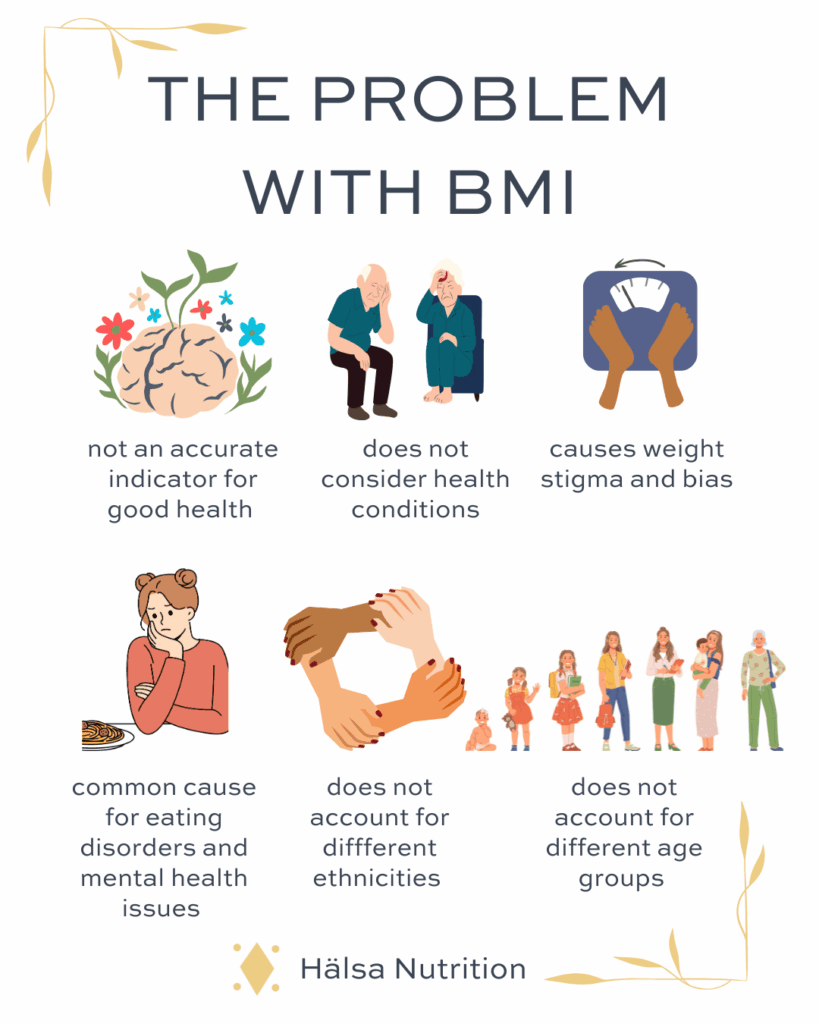
The Problem with the BMI
Most people know what the Body Mass Index (BMI) scale is. BMI is a tool used by medical professionals, like your primary physician or your child’s pediatrician, to determine whether your weight is at a “healthy” range by calculating a score based on your weight and height. Unfortunately, the BMI scale is very flawed and often causes more harm than good.
Why use BMI?
The BMI scale determines what category your weight falls into: “underweight,” “healthy weight,” “overweight,” or “obese.” These categories help assess health and determine your risk for certain health conditions. The BMI is a cheap, quick, accessible, and easy way to bill insurance for services.
What is the history of the BMI?
The BMI was first developed in 1832 thanks to Adolphe Quetelet, an astronomer and statistician (not a health professional). The initial purpose of BMI was to establish characteristics of the “normal man”. All of Quetelet’s subjects were white European males. In 1972, the medical establishment began using the BMI after Ancel Keys updated the research data and coined the term Body Mass Index. Keys built on the work done by Quetelet and collected data on over 7,000 healthy men. While the data included more variety, it still didn’t include women or many minorities. The BMI is therefore not representative of our population as a whole.
Why is the scale not accurate?
The BMI scale comes with many issues. As mentioned, the BMI is not representative of the whole population. In addition, it does not account for age, sex, body composition, fat distribution, or how muscle mass changes with age. This means an athlete who is 18 and is lean compared to a 35-year-old who has type 2 diabetes and is “overweight” might have the same BMI because muscle mass and fat distribution are not accounted for. The scale also assumes that people’s scores can determine their health status and behaviors, which is incorrect. Moreover, the scale doesn’t account for genetics, which can influence body shape and size.
Overall, the BMI scale is not an accurate indicator of good health. For example, someone could be considered “overweight” but be physically fit and in excellent health. Likewise, someone could be categorized at a “healthy” weight, but may have recently lost a lot of muscle or have low cardiovascular fitness. BMI does not determine good health, does not consider health conditions, and does not account for the variety of age groups and ethnicities that have many kinds of body compositions.

How does BMI affect mental health?
Unfortunately, BMI can also harm mental health due to weight stigma. When someone is labeled as “obese” or “overweight,” it can lead them to feel negatively about their bodies. Weight stigma is one of the most common influences of poor mental health and eating disorders. Oftentimes, people experience anxiety when going to the doctor’s and having to step on the scale. Well-meaning healthcare providers may also be quick to make assumptions about why someone is at a higher BMI, rather than asking all the questions.
Studies show that people with a “high” BMI are more likely to develop or experience symptoms of depression, anxiety, and other mood disorders. BMI creates feelings of body image issues, social isolation, and increases the risk of eating disorders. Weight stigma is especially harmful for children and adolescents.
How can BMI cause rigid eating patterns and eating disorders?
There is an increased risk of dieting, rigid eating, and eating disorders associated with having a higher BMI. Social media and societal norms tell us that there is a “right” way to look in society. When someone is unhappy with their BMI–or is told it’s a problem–it often leads to food and body image struggles. Most people will try to lose weight. Unfortunately, weight loss diets have a high failure rate and generally lead to gaining back more weight than what was lost. Disordered eating habits (e.g., those that come with dieting and restriction) also often lead to eating disorders.
How to stop being influenced by the BMI
It’s unlikely that the BMI will stop being used anytime soon. So it’s important to know the limitations of this measurement and recognize that it doesn’t determine your health. The BMI is one data point that health care providers have when assessing health. There is a lot of other data to consider.
The BMI should be used as a screening tool that elicits a deeper assessment of a patient’s health risks. Ideally, everyone–no matter their BMI, should be asked questions about health behaviors that affect health, such as diet, exercise, sleep, stress, and substance use. In addition, it’s important to recognize that weight-loss diets generally do more harm than good; so instead of pursuing weight loss, people should work with dietitians, therapists, and personal trainers to improve body image and make sustainable behavior changes that promote lasting health.
Bottom line: The BMI is a flawed way to determine health. When assessing health, it’s important to look beyond the BMI. Likewise, we need to work to end the stigma that comes with both BMI and weight. Your weight is not your worth. Bodies come in all shapes and sizes.
Other blog posts you might enjoy:
- HAES – A Better Approach to Health and Weight
- What to know about weight loss drugs like Ozempic and Saxenda
- Non-diet smart goals
- Diet Culture and Food Language
About the author
Julia Sullivan is a senior, exercise science-allied health major at Endicott College. She’s on the path to becoming an Exercise Physiologist with an interest in cardiac nutrition. Her interests and passions lie in helping people recover from injury and become healthier to enjoy life to the fullest.
This article was edited and reviewed by Maria Adams, MS, MPH, RDN, LDN, a registered dietitian and Certified Intuitive Eating Counselor. Maria takes a weight-inclusive approach and helps individuals rediscover the joy of food, eat to feel their best, and heal from chronic dieting and disordered eating. She holds a Bachelor of Science Degree in Nutrition Science, a Master of Science in Nutrition Communication, and a Master of Public Health.
Leave a Reply